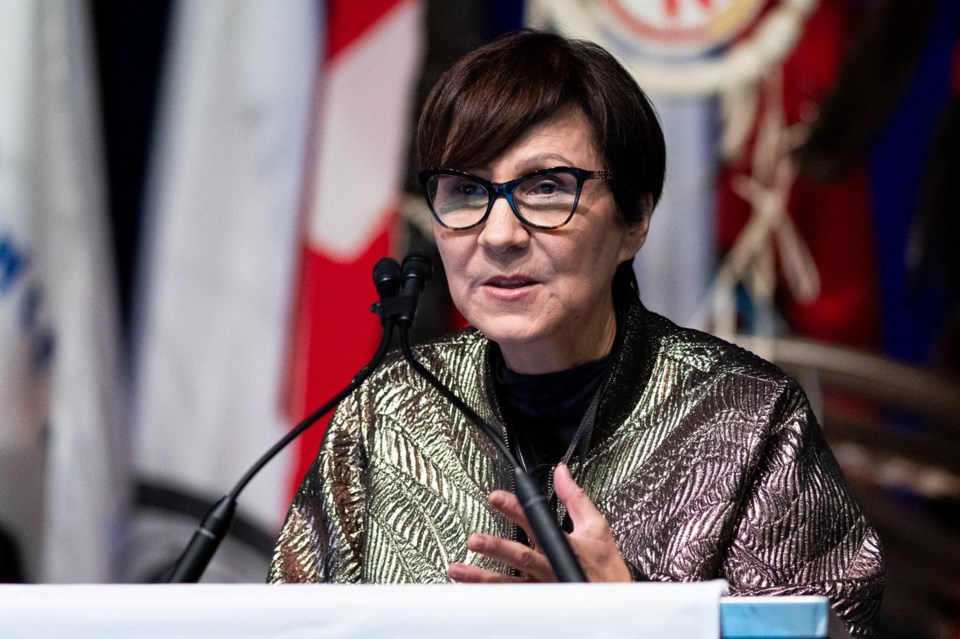OTTAWA — First Nations leaders in Manitoba are calling on the federal government to address a backlog in requests for Indigenous children to receive swift access to health care and other services.
They say the delay in approval of requests under Jordan's Principle has resulted in communities paying out of pocket for health, social or educational services that are supported under the principle, putting other important programming at risk.
The Assembly of Manitoba Chiefs said the backlog has added financial strain to communities, forcing them to provide essential services with limited resources.
"Many First Nations are trying to meet the needs of their families. They are not receiving funding to provide these services. They are currently running deficits," acting Grand Chief Betsy Kennedy told reporters in Ottawa on Thursday during the Assembly of First Nations annual winter meeting.
"First Nations need (Indigenous Services Canada) to fully resource and prioritize full and equitable funding and reimbursement for costs before year's end."
Kennedy added First Nations often have to refer their members to other organizations that are also not getting fully funded to complete requests for assistance.
The principle is named after Jordan River Anderson of Norway House Cree Nation in northern Manitoba. Born in 1999 with multiple disabilities, Anderson died at the age of five without ever leaving the hospital because federal and provincial governments couldn't decide who should pay for his at-home care.
The principle stipulates that when a First Nations child needs health, social or educational services, they are to receive them from the government first approached, with questions about final jurisdiction worked out afterward.
Some projects in the 11 First Nations the Keewatin Tribal Council in northern Manitoba represents are at a standstill because money has had to be allocated to cover the costs of service requests, said Grand Chief Walter Wastesicoot.
"There's a deep, deep hole there right now," he said.
The Keewatin Tribal Council previously had to pay $7 million out of pocket for Jordan's Principle requests before the federal government reimbursed them, said Wastesicoot.
He said the Keewatin communities are currently owed millions, but could not provide an exact amount.
Kennedy said a regional Indigenous Services Canada representative told the assembly that there may not be further funding for First Nations until the fiscal year ends.
Indigenous Services Canada did not immediately respond to a request for comment.
The department says on the government's website that Ottawa has provided more than 8.2 million products, services and supports under the principle from 2016 to the end of October of this year.
The office of Indigenous Services Minister Patty Hajdu previously told The Canadian Press that the department remains focused on ensuring First Nations children can access the services they need, and that since 2016, the federal government has allocated nearly $8.1 billion to meet the needs of First Nations children.
The Manitoba chiefs' complaints come as the Canadian Human Rights Tribunal has ordered Canada to address a backlog of requests.
The First Nations Child and Family Caring Society raised concerns earlier this year that Ottawa was taking too long to process requests for financing through Jordan's Principle, leaving children without access to services.
Cindy Blackstock, executive director of the Caring Society, said the ever-growing backlog is of Canada's own making.
"Canada chose to create these backlogs," she said while supporting chiefs on Thursday.
"They're not saying they're overwhelmed and backlogged with thousands of cases under a Canadian pension plan or under an unemployment insurance. The government does this stuff. It is choosing not to do it and it's making excuses for itself."
Urgent Jordan’s Principle requests are supposed to be processed within 24 hours. But they are taking up to one month to be reviewed, says Independent First Nations, an advocacy body representing a dozen First Nations in Ontario and Quebec.
Blackstock filed an affidavit earlier this year that said nearly half of requests made by individuals from those First Nations in 2023-24 are still in review, along with 10 per cent of the files submitted in 2022-23.
The tribunal ordered Canada to return to it with a detailed plan, timelines and targets to address the backlog before Dec. 10.
-- By Brittany Hobson in Winnipeg.
This report by The Canadian Press was first published Dec. 5, 2024.
The Canadian Press



